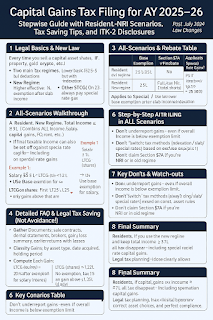By CA Surekha Ahuja
The taxation of capital gains, especially when total income falls below the exemption limit, often raises confusion—particularly in the case of Non-Resident Indians (NRIs). This professional guide breaks down the issue with precision, based on the Income-tax Act, 1961, clarifies exemptions, obligations, and procedural nuances under both old and new tax regimes for AY 2025–26.
Tax Exemption Threshold: Resident vs. NRI (AY 2025–26)
| Particulars | Resident Individual (below 60 years) | Resident Senior Citizen (60–79 years) | Resident Super Senior (80+) | NRI (All Ages) |
|---|---|---|---|---|
| Basic Exemption Limit | ₹2.5 lakhs | ₹3 lakhs | ₹5 lakhs | ₹2.5 lakhs |
| Rebate under Section 87A | Available if Total Income ≤ ₹7 lakhs (New Regime) | Available | Available | Not available |
| Benefit of Adjusting Basic Exemption Limit Against LTCG | Available | Available | Available | Not available |
Is Filing ITR Mandatory if Total Income (Including Capital Gain) is Below Threshold?
For Resident Individuals
-
Not mandatory, if:
-
Total income after claiming exemptions and deductions is below the applicable basic exemption limit.
-
However, if TDS has been deducted (e.g., on property sales, mutual funds), filing is advisable to claim refunds.
-
For NRIs
-
ITR filing becomes mandatory, if:
-
Capital gains income exceeds the basic exemption limit (₹2.5 lakhs).
-
Even if below ₹2.5 lakhs, TDS at flat rates (e.g., 10%, 15%, 20%) is deducted, and a refund is required.
-
Capital gains are not allowed to be reduced by the basic exemption limit.
-
Illustration Scenarios
Example 1: Resident Individual (Old Regime)
-
Interest Income: ₹1,80,000
-
LTCG on Equity: ₹60,000
-
Total Income: ₹2,40,000
-
Tax Payable: Nil
-
ITR Filing: Not mandatory, but advisable if TDS deducted or loss to be carried forward.
Example 2: Resident Individual (New Regime)
-
Salary: ₹4,20,000
-
LTCG (112A): ₹2,10,000 (Out of which ₹1,00,000 exempt)
-
Net LTCG Taxable: ₹1,10,000 @10% = ₹11,000
-
Total Income: ₹5,30,000
-
Rebate u/s 87A applicable → Final Tax = Nil
-
ITR Filing: Mandatory if total income before deduction exceeds ₹2.5 lakhs.
Example 3: NRI
-
Interest from NRO: ₹6,000
-
LTCG on Listed Shares (after indexation): ₹60,000
-
Total Income: ₹66,000
-
Tax Deducted: ₹12,000 (assumed 20% on capital gains)
-
Tax Payable: Likely Nil (if cost inflation adjusted)
-
Refund: Yes
-
ITR Filing: Mandatory to claim refund and comply.
Procedural Guide: ITR Filing for Capital Gains
| Step | Action |
|---|---|
| 1. Identify Asset Type | Equity shares, mutual funds, property, gold, etc. |
| 2. Determine Holding Period | Short-Term vs. Long-Term gains based on asset class |
| 3. Apply Relevant Section | Section 111A (STT paid equity), 112A (LTCG on equity), 112 (other LTCG), 115E/115C for NRIs |
| 4. Compute Indexed Cost (if LTCG allowed indexation) | Apply CII for FY 2024–25 (currently 363) |
| 5. File ITR | Use ITR-2 for capital gains (residents or NRIs). Report in Schedule CG with full breakup. |
Caution Points for Taxpayers
| Point | Applicability |
|---|---|
| LTCG adjustment against basic exemption not allowed for NRIs | ✔️ Yes |
| Tax deducted at flat rates must be claimed via ITR | ✔️ Yes |
| Clubbing of capital loss with other income disallowed | ✔️ Except under specific provisions |
| Capital loss cannot offset STCG under Section 111A or LTCG under 112A | ✔️ Subject to conditions |
| TDS credit (Form 26AS / AIS) mismatch may delay refund | ✔️ Check Form 26AS before filing |
Tax Planning Insights
| Strategy | Description |
|---|---|
| Use Indexation Wisely | NRIs can claim indexation benefit for property under Section 112 |
| Choose Between Old vs. New Regime | LTCG impact may differ – compute both |
| Spread Gains Across Years | Plan sales to utilize basic exemption over multiple FYs |
| Claim DTAA Relief | Use Form 67 for FTC if foreign tax paid |
| Use Set-off Rules | Set off STCL/STT-LTCG with eligible gains for same or next 8 years |
FAQs
Q1: Is LTCG exempt up to ₹1 lakh for NRIs?
Yes, on listed equity shares/mutual funds covered under Section 112A.
Q2: Can NRI claim refund if total income is less than ₹2.5 lakhs?
Yes, by filing ITR and claiming credit of TDS.
Q3: Can Resident Senior Citizens skip filing if LTCG is small?
Yes, if total income is below exemption limit and no TDS deducted.
Q4: Can basic exemption be adjusted against LTCG?
Yes, for Residents. No, for NRIs.
Q5: Which ITR to use for capital gains?
ITR-2 (most appropriate for both Residents and NRIs with capital gains).
Final Summary Sheet
| Situation | ITR Mandatory | Remarks |
|---|---|---|
| Resident, total income below ₹2.5L | ❌ Optional (if no TDS) | |
| Resident, LTCG within limit + rebate u/s 87A | ✅ Yes | |
| NRI, capital gains even below ₹2.5L | ✅ Yes (to claim refund or disclose) | |
| LTCG on equity > ₹1L | ✅ Yes (always taxable at 10%) | |
| TDS deducted on capital gains | ✅ Yes (for refund claim) |
While residents enjoy more flexibility in claiming exemptions and avoiding return filing under threshold limits, NRIs are subject to flat taxation on capital gains, with limited offsets. Filing ITR is essential not just for compliance but also for claiming refunds and carry-forward of losses.
Proper reporting, document maintenance (e.g., broker summary, AIS, Form 26AS), and awareness of applicable sections can help avoid notices and optimize your tax outgo.

